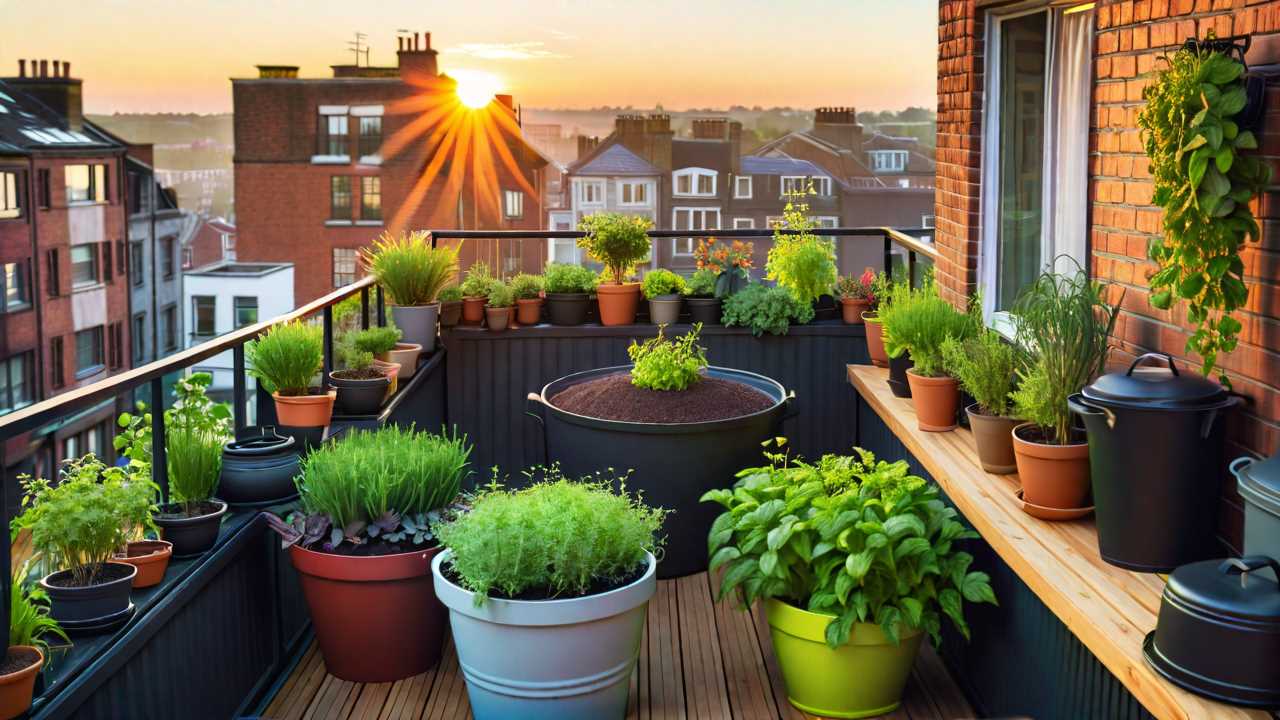
When you look out at your small urban space, do you ever wonder how you could turn it into a thriving homestead? With the rise of urban homesteading, there are numerous innovative ways you can transform your limited area into a sustainable oasis. From container gardening to vertical farming solutions, mini livestock keeping, and sustainable DIY projects, the possibilities are endless. By exploring these methods further, you will uncover practical techniques to cultivate your own food, raise animals, and live a more self-sufficient lifestyle within the confines of your urban setting.
Container Gardening
To maximize your space and grow a variety of plants, consider utilizing containers for your urban homesteading garden. Containers offer flexibility, allowing you to place them on balconies, patios, or even indoors near a sunny window. When selecting containers, opt for different sizes and shapes to accommodate various types of plants.
For instance, larger containers are ideal for vegetables like tomatoes, while smaller pots work well for herbs or flowers.
To make the most of your container garden, guarantee proper drainage by drilling holes in the bottom of each container. This prevents waterlogging, which can harm your plants. Additionally, choose lightweight containers if you plan to move them around frequently. Upcycling old buckets, tin cans, or wooden crates can add a unique touch to your garden while being environmentally friendly.
Consider vertical gardening techniques to further maximize space. Hanging baskets, trellises, or stackable planters allow you to grow upwards, increasing your planting area. Remember to group plants with similar sunlight and water requirements together for easier maintenance.
Vertical Farming Solutions
Consider implementing vertical farming solutions to efficiently utilize space and increase your urban homesteading garden's productivity.
Vertical farming involves growing plants in vertically stacked layers, allowing you to make the most of limited space. One creative idea is to use a trellis system against a wall to grow climbing plants like beans, peas, or tomatoes. This method not only saves ground space but also adds a visually appealing element to your garden.
Another useful technique is utilizing hanging planters or vertical planters. These can be hung on walls, fences, or balconies, providing a solution for growing herbs, small vegetables, or even flowers without taking up precious ground space.
Additionally, consider installing a vertical hydroponic system, which uses nutrient-rich water to grow plants vertically, eliminating the need for soil and maximizing growth efficiency.
Mini Livestock Keeping
Discover the potential of keeping mini livestock in your urban homesteading space to maximize self-sufficiency and sustainability. Mini livestock can be a valuable addition to your small urban homestead, providing you with fresh eggs, milk, or even fiber.
Here's how you can incorporate mini livestock into your space:
- Rabbits: These small animals are excellent for small spaces and can be raised for meat, fur, or as pets. They're quiet, easy to care for, and can be housed in a relatively small area.
- Quail: Quails are perfect for urban settings due to their small size and low maintenance requirements. They lay delicious eggs and can thrive in a compact enclosure.
- Pygmy Goats: These miniature goats are friendly, playful, and great for producing milk. They can be trained to walk on a leash, making them a unique addition to your urban homestead.
Sustainable DIY Projects
Discover sustainable DIY projects that can enrich your urban homesteading space and advance your journey towards self-sufficiency and eco-friendly living.
Upcycling old containers into self-watering planters is a fantastic project to grow herbs or vegetables even in limited spaces. By using materials like plastic bottles or mason jars, you can create a constant water supply for your plants, reducing water waste and maintenance.
Another great idea is building a compost bin to recycle kitchen scraps and create nutrient-rich soil for your garden. You can construct one using wooden pallets or plastic bins, turning organic waste into a valuable resource for your plants.
Creating a rainwater harvesting system is another sustainable DIY project that can benefit your urban homesteading efforts. By collecting rainwater in barrels or tanks, you can reduce your reliance on municipal water sources for gardening or other non-potable water needs.
Additionally, building a small solar-powered system to charge your phone or light up your outdoor space can help you adopt renewable energy in your daily life. These projects not only promote sustainability but also add a touch of creativity and resourcefulness to your urban homesteading journey.
Frequently Asked Questions
How Can I Incorporate Composting in a Small Urban Space?
Incorporate composting in a small urban space by trying vermicomposting with a worm bin. It's efficient, odorless, and perfect for balconies or closets. Use shredded paper, fruit & veggie scraps - your plants will love it!
What Are Some Creative Ways to Save Water in Urban Homesteading?
To save water in urban homesteading, consider installing a rain barrel to collect runoff for gardening, using greywater from showers for plants, and incorporating drought-resistant landscaping. These methods can help you conserve water efficiently.
Is It Possible to Generate Renewable Energy in a Small Urban Setting?
Generating renewable energy in a small urban setting is totally doable. Solar panels on your roof or balcony, a small wind turbine, or even a micro-hydro system can help power your homestead sustainably.
Are There Regulations on Keeping Chickens or Bees in Urban Areas?
Check local ordinances before keeping chickens or bees in urban areas. Many cities have regulations on coop size, distance from residences, and number of animals allowed. Urban homesteading can be rewarding with proper research.
How Can I Practice Food Preservation in a Limited Space?
To practice food preservation in a limited space, try canning small batches of produce, fermenting vegetables in jars, dehydrating fruits and herbs, or making homemade jams and pickles. Utilize shelves, cabinets, and even under-bed storage for your preserved goods.
 SportsHollywoodLifestyleFashionHome & GardenTrendsPrivacy PolicyTerms And Conditions
SportsHollywoodLifestyleFashionHome & GardenTrendsPrivacy PolicyTerms And Conditions
